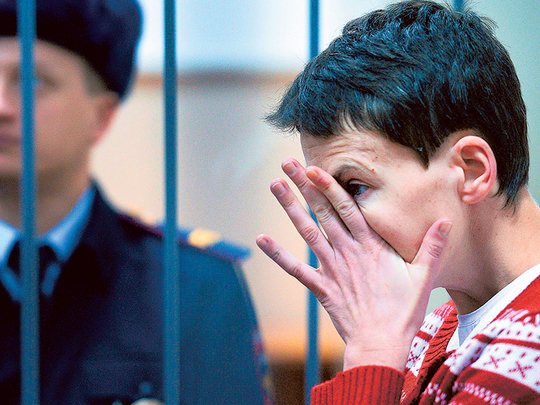
Donetsk, Russia: Ukrainian pilot and lawmaker Nadiya Savchenko went on trial in Russia on Thursday in a politically charged case that could send ties between Moscow and Kiev to a new low.
The 34-year-old helicopter navigator faces up to 25 years in prison for her alleged involvement in the killing of two Russian journalists in war-torn eastern Ukraine last year.
Savchenko, who is seen by her compatriots as a symbol of resistance against what most Ukrainians consider an insurgency fuelled by President Vladimir Putin’s government, has denied any involvement.
After more than a year in detention, Savchenko was in the dock in the small southern Russian town of Donetsk on the border with eastern Ukraine.
Her lawyers say the authorities opted to try their client outside Moscow in violation of legal procedures and say the choice of venue was aimed at shielding the hearings from the public eye.
There was a heavy police presence for the trial, which started with a closed preliminary hearing.
Embassy staff from several countries including Britain, the United States as well as the European Union were in Donetsk to observe the trial.
“She is OK,” defence lawyer Mark Feigin said on Twitter after seeing Savchenko.
Her legal team — including Feigin who said he took a flak jacket to Donetsk — asked that the trial be moved to Moscow and away from a town near a conflict zone.
“The Donetsk city court cannot hear this case because there is not one condition that would ensure a ... comprehensive legal process,” Feigin told reporters.
Donetsk has no jail and Savchenko has to be transported to hearings from Novocherkassk, a city nearly two hours away by car.
Few doubt that Savchenko’s fate will be decided in the Kremlin, and Western leaders as well as Ukrainian President Petro Poroshenko of Ukraine have called on Putin to let her go.
Two journalists from Russian public broadcaster VGTRK, Igor Kornelyuk and Anton Voloshin, died in shelling on June 17, 2014, in Ukraine’s Lugansk region.
Russian prosecutors say Savchenko was involved in the killing in her capacity as a volunteer in a Ukrainian battalion.
The prosecution also accuses her of illegally crossing the border into Russia where she was detained.
Savchenko has denied the charges and refused food for more than 80 days to protest at her detention. She broke off her hunger strike in March because of severe health problems.
The defence argues that phone bills confirmed she had already been taken prisoner by separatists when the journalists died, and was taken to Russia against her will.
Russia denied Savchenko a jury trial, which statistically is more likely to deliver a not-guilty verdict.
Moscow is prosecuting Savchenko despite diplomatic immunity she enjoys as a lawmaker and a member of the Ukrainian delegation to the Parliamentary Assembly of the Council of Europe.
Kiev accuses Russia of kidnapping and smuggling her across the border, and the Ukraine prosecutor’s office announced Wednesday it suspected six Russian officials of taking part in her detention and prosecution.
Savchenko’s supporters hope that even if convicted, she will not have to serve out her sentence in full and some observers do not rule out that she may be swapped for Russian servicemen detained by Ukraine.
Another of Savchenko’s lawyers, Ilya Novikov, said Russia is likely to rush through the trial.
“This is a political case pursued by Russia, and in Russia political cases are predictable,” he said.
“We’ll be working on the assumption that the sentence has already been written and it’s the harshest possible.”
Savchenko is one of the first Ukrainian women to train as an air force pilot and served in Iraq for six months.
In an interview with a Ukrainian newspaper in 2009, she said she could go without sleep for five days and had no problem sharing a room at night “with 25 guys”.
Kiev and the West accuse Russia of sending weapons and troops across the border to help separatists in a conflict that has claimed at least 6,800 lives since April 2014.
Four civilians were killed in new shelling attacks between government forces and separatists on Thursday.












